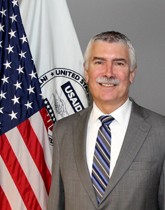- Who We Are
- Mission, Vision and Values
- Organization
- Leadership
- Office of the Administrator
- Bureaus
- Africa
- Asia
- Europe and Eurasia
- Latin America and the Caribbean
- Middle East
- Democracy, Conflict and Humanitarian Assistance
- Economic Growth, Education and Environment
- Food Security
- Global Health
- Legislative and Public Affairs
- Management
- Policy, Planning and Learning
- Foreign Assistance
- U.S. Global Development Lab
- Independent Offices
- Mission Directory
- Staff Directory
- Advisory Committee
- Board for International Food and Agricultural Development
- Mission Directors
- Coordinators
- Global Development Council
- USAID History
- Operational Policy (ADS)
- Transparency
- Resource Portal

Rob Bertram is the Chief Scientist in USAID’s Bureau for Food Security, where he serves as a key adviser on a range of technical and program issues to advance global food security and nutrition. In this role, he leads USAID’s evidence-based efforts to advance research, technology and implementation in support of the U.S. Government’s global hunger and food security initiative, Feed the Future.
He previously served as Director of the Office of Agricultural Research and Policy in the Bureau for Food Security, which leads implementation of the Feed the Future research strategy and related efforts to scale innovations in global food security efforts, working with a range of partners. Prior to that, he guided USAID investments in agriculture and natural resources research for many years.
Dr. Bertram’s academic background in plant breeding and genetics includes degrees from University of California, Davis, the University of Minnesota and the University of Maryland. He also studied international affairs at Georgetown University and was a visiting scientist at Washington University in St. Louis. He has been especially active in plant genetic resources policy as it relates to research for development, including applications of biotechnology in food security-related research.
Before coming to USAID, he served with USDA's international programs as well as overseas with the Consultative Group on International Agricultural Research (CGIAR) system.







Comment
Make a general inquiry or suggest an improvement.